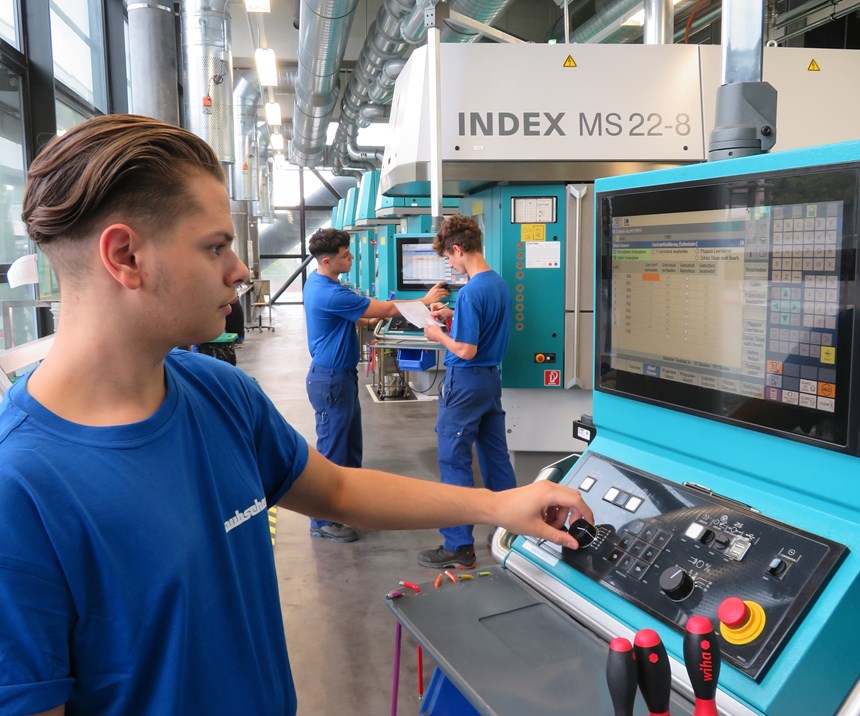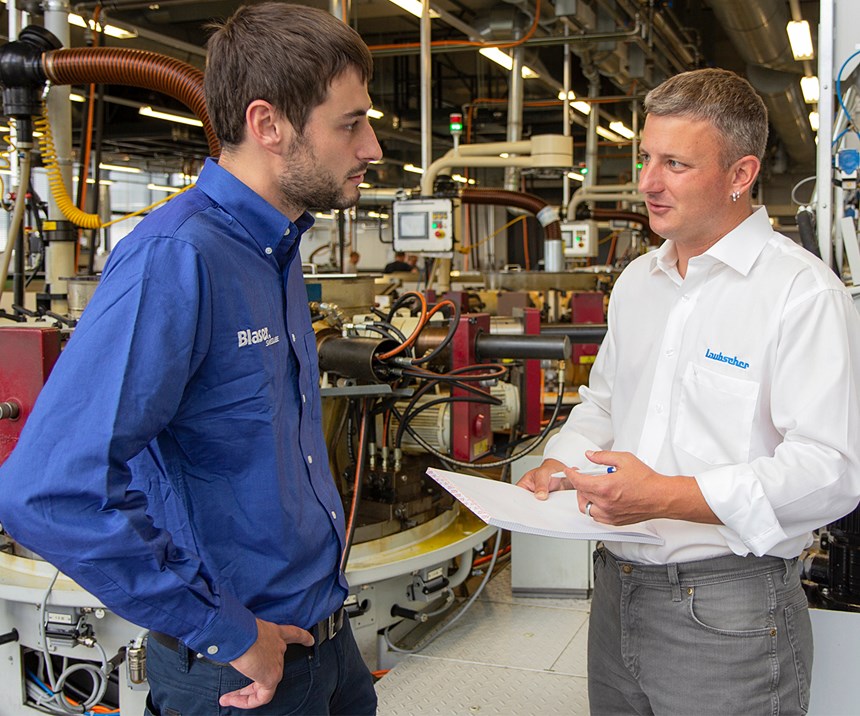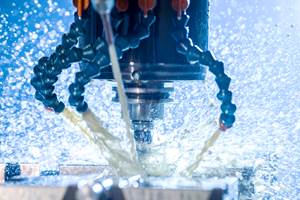Coolant Supplier Optimizes Customer’s Machining Process
When a precision manufacturer wanted to rebuild the production process for a medical part made on a rotary transfer machine, its metalworking fluids supplier provided more than a new cutting oil.
Many factors affect a machining process—the material, machine, cutting tool, machining strategy, coolant and more all play a role in how efficient a process is. And when shops want to optimize their machining processes, each of these factors must be considered. Optimization can be a long and complicated process to accomplish, and shops often reach out to a partner to help.
Laubscher Präzision AG, based in Täuffelen, Switzerland, produces precision turned parts for applications including medical devices, building technology and watches. The company uses a range of machines to produce these parts, including Swiss-type machines, CNC single- and multi-spindle lathes, five-axis machining centers and grinding machines. The company also has multiple rotary transfer machines from Pfiffner (which is partnered with Hydromat in America). About two years ago, the company wanted to rebuild an existing production process for a medical part on one of its rotary transfer machines and optimize it step by step. The part was made from Inox 1.4305 and required several operations, including milling, drilling, turning and sawing. Especially important to the company was improving the process’s “soft factors,” such as finding a low-foam, transparent cutting oil that reduced mist.
“We wanted to take a look at the entire process with our coolant partner, Blaser Swisslube, to have a more productive process,” says Mirko Laubscher of Laubscher AG.
Turning to a coolant supplier to optimize an entire part production process might not be the most obvious choice, but Blaser can provide its customers with more than just metalworking fluids. The company has an in-house technology center where it can assess more than just the right fluid for an application—it can optimize the machining strategy and tools as well.
“In our technology center, we can not only test newly developed metalworking fluids extensively, but also simulate our clients’ processes,” explains Christoph Wüthrich, head of Blaser Swisslube’s technology center. “We have to remember that factors such as machinery, strategy, tools, materials and coolants are decisive influences on the machining process.”
When Blaser starts a joint project, it looks at all factors in the process, including the machine, tools, material, machining strategy and coolant. If it can realistically recreate the partner company’s machining environment, it can look at each step in the process and perform tests to improve it overall. This service can be helpful for customers who lack the time to precisely analyze their processes for optimization.
In its technology center, Blaser Swisslube tested tools and coolants, and analyzed the steps in the process so they could be optimized. “We took our time to test each parameter individually so that we could improve the production process sustainably,” explains Simon Sakica, application engineer at Blaser Swisslube. Laubscher oversaw and supervised the project’s development, which included regular meetings and visits to the technology center.
The optimization process also included an assessment of the metalworking fluids. “We replaced a universal cutting oil with a transparent, latest-generation, high-performance cutting oil,” Mr. Sakica says. The new oil, Blasomill GT 22, is transparent to give machine operators a clear view of the metalcutting process, especially on the workpiece. It is also low-foaming, which is important because the air in the foam prevents optimal cooling of the cutting edge. The oil also has the benefit of being low-mist. Blasomill GT 22 has no water component, unlike other water-miscible coolants, so it can have a long life cycle with continuous monitoring and proper care, including a filtering system that removes chips and other residues from the oil. Blaser says some of its high-performance cutting oils can be used for several years before needing to be replaced, helping both the environment and the user’s wallet.
The optimization process took a year and a half, but the time was well spent. Blaser was able to reduce the cycle time by more than 16 percent and optimize the process so that two stations on the rotary transfer machine were no longer needed. Laubscher also switched to high-performance step tools, increasing tool life by about 15 precent. “Extremely satisfying project results through and through, fulfilling our every expectation,” Mr. Laubscher says. “We’re excited about implementing the changes in our production.” The findings from the project can be used to optimize additional operations, including on other machines at Laubscher.
The experience has also been a positive one for Blaser. “We were able to provide a measurable added value to the production process via these optimizations,” Mr. Sakica says. “Blaser Swisslube’s cutting oil, Blasomill GT 22, has convinced everyone with its transparency, low foam and reduced oil mist.” It has also shown that factors such as productivity, economic efficiency and machining quality are dependent on on the choice and quality of the metalworking fluid and know-how of the machinists.
In addition to the coolant, Blaser’s knowledge of sales, research and development, technology and customer service solidify its status as a partner. Blaser can also use the data collected during this project to compare and improve other processes. This expertise transforms a metalworking fluid into a “liquid tool,” a solution that is tailored to the partner’s specific needs.
Laubscher Präzision AG | Laubscher-praezision.ch/en/
Related Content
High-Performance Coolant for High-Pressure, High-Flow Machining Centers
PMTS 2023: Saf-T-Cool 4200’s natural low foam characteristics make it compatible with today’s high-pressure, high-flow machining centers.
Read MoreHeavy-Duty Synthetic Coolant for Machining, Grinding
PMTS 2023: Fortech’s TechKool FT4000 synthetic coolant is formulated to reject tramp oil that can cause smoking or misting and premature spoilage of coolant.
Read MoreAutomating Cutting Fluid Management
Automation can amplify the benefits of cutting fluid management while reducing the maintenance burden on shopfloor employees.
Read MoreAutomate Coolant Management, Collect Data to Optimize Machining Operations
The future of coolant management lies in better control through automation and applying real-time data analysis and insights.
Read MoreRead Next
A Tooling Workshop Worth a Visit
Marubeni Citizen-Cincom’s tooling and accessory workshop offers a chance to learn more about ancillary devices that can boost machining efficiency and capability.
Read MoreDo You Have Single Points of Failure?
Plans need to be in place before a catastrophic event occurs.
Read More5 Aspects of PMTS I Appreciate
The three-day edition of the 2025 Precision Machining Technology Show kicks off at the start of April. I’ll be there, and here are some reasons why.
Read More














.jpg;maxWidth=300;quality=90)










